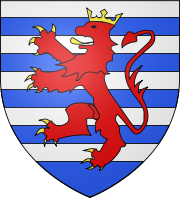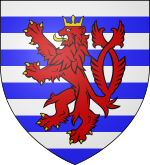Wenceslaus, King of the Romans

Wenceslaus (also Wenceslas) (Czech: Václav, German: Wenzel, Italian: Venceslao) (26 February 1361 – 16 August 1419) was, by election, the German King (formally King of the Romans) from 1376 and, by inheritance, King of Bohemia (as Wenceslaus IV) from 1378. He was the third Bohemian and second German monarch of the House of Luxembourg. He was deposed in 1400 as the German King, but continued to rule as King of Bohemia.
Contents |
Biography
Wenceslaus was born at Nuremberg. He was crowned King of Bohemia in 1363.
In 1373, Wenceslaus' father, Charles IV, Holy Roman Emperor, obtained for him the Electoral Margraviate of Brandenburg. In 1376, he also obtained Wenceslaus' election as King of the Romans by the five remaining prince-electors, while two of the electoral votes, Brandenburg and Bohemia, were held by the emperor and his son, themselves.
In order to secure the election of his son, Charles IV revoked the privileges of many Imperial Cities that he had earlier granted, and mortgaged them to various nobles. The cities, however, were not powerless, and as executors of the public peace, they had developed into a potent military force. Moreover, as Charles IV had organised the cities into leagues, he had made it possible for them to cooperate in large-scale endeavors. Indeed, on 4 July 1376, two days after Wenceslaus' election, fourteen Swabian cities bound together into an independent league to defend their rights against the newly elected King. The Swabian League soon attracted other members and until 1389 acted as an independent state within the Empire.
Rule over the Empire and Bohemia
On Charles's death in 1378, Wenceslaus inherited Bohemia. In the cathedral of Monza there is conserved a series of reliefs depicting the coronations of the kings of Italy with the Iron Crown of Lombardy. The seventh of these depicts Wenceslaus being crowned in the presence of six electors, he himself being the seventh. The depiction is probably not accurate and was likely made solely to reinforce the claims of the cathedral on the custody of the Iron Crown.
A quarrel between the Frederick of Bavaria and the archbishop of Salzburg gave the signal for a general war in Swabia, in which the cities, weakened by their isolation, mutual jealousies and internal conflicts, were defeated by Count Eberhard II. at Doffingen (24 August 1388), and were severally taken and devastated. Most of them quietly acquiesced when King Wenceslaus proclaimed an arrangement at Cheb (Eger) in 1389 which prohibited all leagues between cities, whilst confirming the political autonomy of the cities. This arrangement provided a modicum of stability for the next several decades.
As King Wenceslaus IV of Bohemia sought to protect the religious reformer Jan Hus and his followers against the demands of the Roman Catholic Church for their suppression as heretics. This caused many Germans to leave the University of Prague, and set up their own University at Leipzig. Hus was executed in Konstanz in 1415, and the rest of Wenceslaus's reign in Bohemia featured precursors of the Hussite Wars that would follow his death.
During his long reign Wenceslaus's grip on power in both Germany and Bohemia was tenuous at best, as he came into repeated conflicts with the Bohemian nobility. On two occasions he was even imprisoned for lengthy spells by rebellious nobles.
Wenceslaus' greatest liability proved to be his own family. Charles IV had divided his holdings among his sons and other relatives. Although Wenceslaus retained Bohemia, his brothers Sigismund and John received Brandenburg and Lusatia. Moravia was divided between his cousins Jobst and Procopius, and his uncle Wenceslas was made Duke of Luxemburg. Hence the young king was left without the resources his father had enjoyed. In 1386, Sigismund became king of Hungary, and became involved in affairs further east. Wenceslaus also faced serious opposition from the Bohemian nobles and from Jan z Jenštejna, Archbishop of Prague.
The torture and murder of the Vicar General of Prague, John of Nepomuk, by royal officials in 1393 sparked a noble rebellion. In 1394 his cousin Jobst of Moravia was named regent and Wenceslaus was imprisoned. Sigismund of Hungary arranged a truce in 1396, and for his efforts was recognized as Wenceslaus' heir.
Dethronement
Because of the troubles in Bohemia, Wenceslaus had not been to Germany in 10 years. Consequently, he faced anger at the Diets of Nuremberg (1397) and Frankfurt (1398). The Rhenish electors accused him failing to maintain the public peace or to resolve the Schism. The electors demanded that Wenceslaus appear before them to answer to the charges in June 1400. Wenceslaus demurred, in large part because of renewed hostilities in Bohemia. When he failed to appear, the electors declared him deposed in August 1400 on account of drunkenness and incompetence, and chose the Palatine Elector, Ruprecht III, as their king, though Wenceslaus refused to acknowledge this successor's decade-long reign.
In 1402 Wenceslaus was again imprisoned and temporarily deposed, this time by his younger brother Sigismund, with the support of the Czech nobility. Lord John of Liechtenstein, with his retinue of knights, successfully freed Wenceslaus from his Vienna prison in autumn of 1403, and accorded him refuge in his Moravian castle. John of Liechtenstein was at the time the Lord of the Mikulov demesne.[1]
Among the charges that Ruprecht III had used as the basis for his predecessor's deposition was the Great Schism. Ruprecht called the council of Pisa in 1409, attended by defectors from both papal parties. They elected a third pope, only worsening the situation, and from 1409 to 1417, there were three popes.
After the death of Ruprecht in 1410, his succession at first proved difficult, as both Wenceslaus' cousin Jobst of Moravia and Wenceslaus' brother Sigismund of Hungary were elected King of Germany. Wenceslaus himself had never recognized his deposition and hence still claimed the Kingship. Jobst died in 1411, and Wenceslaus agreed to give up the crown, so long as he could keep Bohemia. This settled the issue, and after 1411, Sigismund reigned as king and later also became Emperor.
The bishops and secular leaders, tired of the Great Schism, supported Sigismund when he called the Council of Constance in 1414. The goal of the council was to reform the church in head and members. What made it work was the translation of supreme authority from the popes to the council. In 1417, the council deposed all three popes and elected a new one, maintaining all the while that the council, and not the pope, was the supreme head of the church. By resolving the schism, Sigismund restored the honour of the imperial title and made himself the most influential monarch in the west.
Wenceslaus died in 1419 of a heart attack during a hunt in the woods surrounding his castle Nový Hrádek near Prague (today a part of Prague), leaving the country in a deep political crisis. The death of Wenceslaus is followed by almost two decades of conflict called the Hussite Wars which were centred around greater calls for religious reform by Jan Hus and from the popular outrage provoked by his martyrdom.
Personal life
Wenceslaus was married twice, first to Joanna of Bavaria on 29 September 1370. Following her death on 31 December 1386, he married her first cousin once removed, Sofia of Bavaria on 2 May 1389. He had no children by either wife.
Ancestors
| Ancestors of Wenceslaus, King of the Romans | ||||||||||||||||||||||||||||||||||||||||||||||||||||||||||||||||||||||||||||||||||||||||||||||||||||||||||||||||||||||||||||||||||||||||||||||||||||||||||||||||||||||||||||||||||||||||||||||||||||||||||||||||||||||||||||||||||||||||||||||||||||||||||||||||||||||||||||||||||||||||||||||||||||||||||||||||||||||||||||||||||||||||||||||||||||||||||||||||||||||||||||||||||||||||||||||||||||||||||||||||||||||||||||||||||||||||||||||||||||||||||||||||||||||||||||||||||||||||||||||||||||||||||||||||||||||||||||||||||||||||||||||||||||||||||||||||||
|---|---|---|---|---|---|---|---|---|---|---|---|---|---|---|---|---|---|---|---|---|---|---|---|---|---|---|---|---|---|---|---|---|---|---|---|---|---|---|---|---|---|---|---|---|---|---|---|---|---|---|---|---|---|---|---|---|---|---|---|---|---|---|---|---|---|---|---|---|---|---|---|---|---|---|---|---|---|---|---|---|---|---|---|---|---|---|---|---|---|---|---|---|---|---|---|---|---|---|---|---|---|---|---|---|---|---|---|---|---|---|---|---|---|---|---|---|---|---|---|---|---|---|---|---|---|---|---|---|---|---|---|---|---|---|---|---|---|---|---|---|---|---|---|---|---|---|---|---|---|---|---|---|---|---|---|---|---|---|---|---|---|---|---|---|---|---|---|---|---|---|---|---|---|---|---|---|---|---|---|---|---|---|---|---|---|---|---|---|---|---|---|---|---|---|---|---|---|---|---|---|---|---|---|---|---|---|---|---|---|---|---|---|---|---|---|---|---|---|---|---|---|---|---|---|---|---|---|---|---|---|---|---|---|---|---|---|---|---|---|---|---|---|---|---|---|---|---|---|---|---|---|---|---|---|---|---|---|---|---|---|---|---|---|---|---|---|---|---|---|---|---|---|---|---|---|---|---|---|---|---|---|---|---|---|---|---|---|---|---|---|---|---|---|---|---|---|---|---|---|---|---|---|---|---|---|---|---|---|---|---|---|---|---|---|---|---|---|---|---|---|---|---|---|---|---|---|---|---|---|---|---|---|---|---|---|---|---|---|---|---|---|---|---|---|---|---|---|---|---|---|---|---|---|---|---|---|---|---|---|---|---|---|---|---|---|---|---|---|---|---|---|---|---|---|---|---|---|---|---|---|---|---|---|---|---|---|---|---|---|---|---|---|---|---|---|---|---|---|---|---|---|---|---|---|---|---|---|---|---|---|---|---|---|---|---|---|---|---|---|---|---|---|---|---|---|---|---|---|---|---|---|---|---|---|---|---|---|---|---|---|---|---|---|---|---|---|---|---|---|---|---|---|---|---|---|---|---|---|---|---|---|---|---|---|---|---|---|---|---|---|---|---|---|---|---|---|---|---|---|---|---|---|---|---|---|---|---|---|---|---|---|---|---|---|---|---|---|---|---|---|---|---|---|---|---|---|---|---|---|---|---|---|---|---|---|---|---|---|---|---|---|---|---|---|---|---|---|---|---|---|---|---|---|---|---|---|---|---|---|---|---|---|---|---|---|---|
|
||||||||||||||||||||||||||||||||||||||||||||||||||||||||||||||||||||||||||||||||||||||||||||||||||||||||||||||||||||||||||||||||||||||||||||||||||||||||||||||||||||||||||||||||||||||||||||||||||||||||||||||||||||||||||||||||||||||||||||||||||||||||||||||||||||||||||||||||||||||||||||||||||||||||||||||||||||||||||||||||||||||||||||||||||||||||||||||||||||||||||||||||||||||||||||||||||||||||||||||||||||||||||||||||||||||||||||||||||||||||||||||||||||||||||||||||||||||||||||||||||||||||||||||||||||||||||||||||||||||||||||||||||||||||||||||||||
See also
- Kings of Germany family tree
Notes
- ↑ This rescue is still celebrated annually to this day in Mikulov, in the three-day long Pálava vintage festival that takes place each September.
References
- Lindner, Thomas. Deutsche Geschichte unter den Habsburgern und Luxemburgern. Vol. II. Stuttgart, 1893.
|
Wenceslaus, King of the Romans
House of Luxembourg
Born: 26 February 1361 Died: 16 August 1419 [aged 58] |
||
| Preceded by Charles IV |
German King (formally King of the Romans) 1376–1400 |
Succeeded by Rupert |
| King of Bohemia 1378–1419 |
Succeeded by Sigismund |
|
| Preceded by Otto V, Duke of Bavaria |
Elector of Brandenburg 1373–1378 |
|
|
|||||||||||||||||||||||||||||||
|
||||||||||||||||||||||||||||||||||||||||||||||||||||||||||||||||||||


